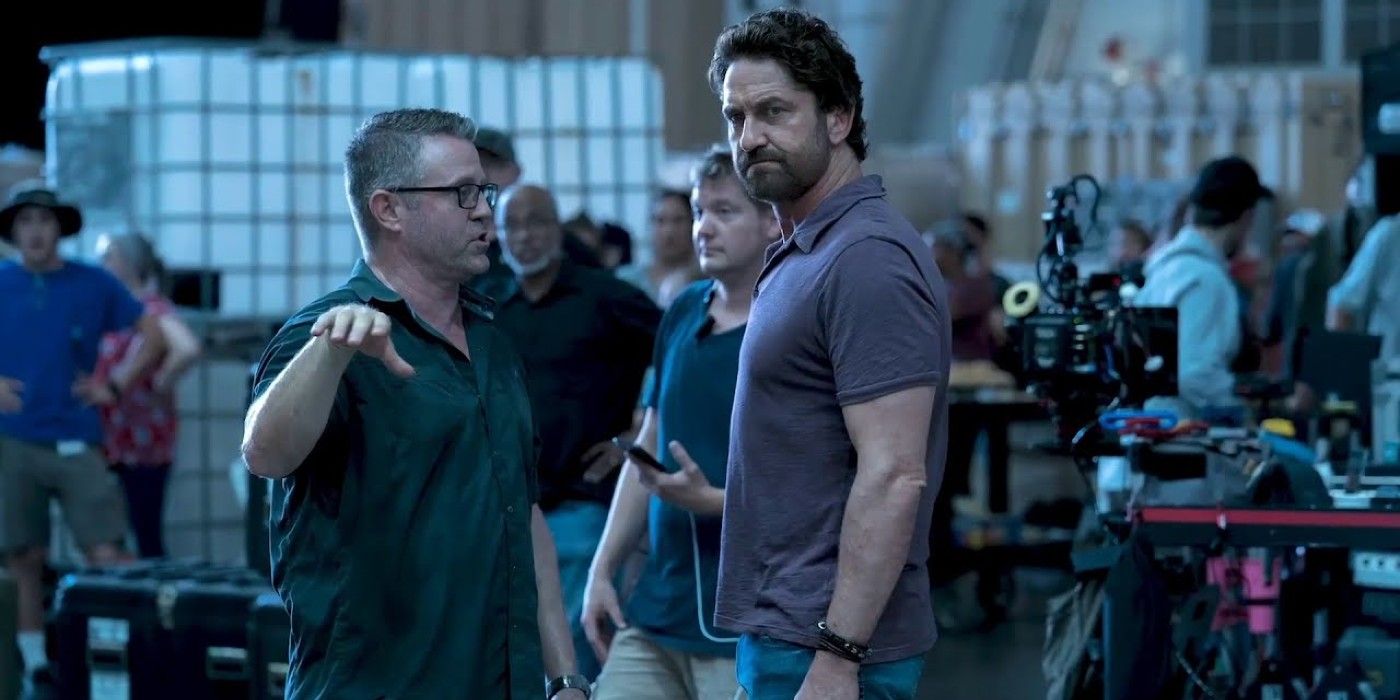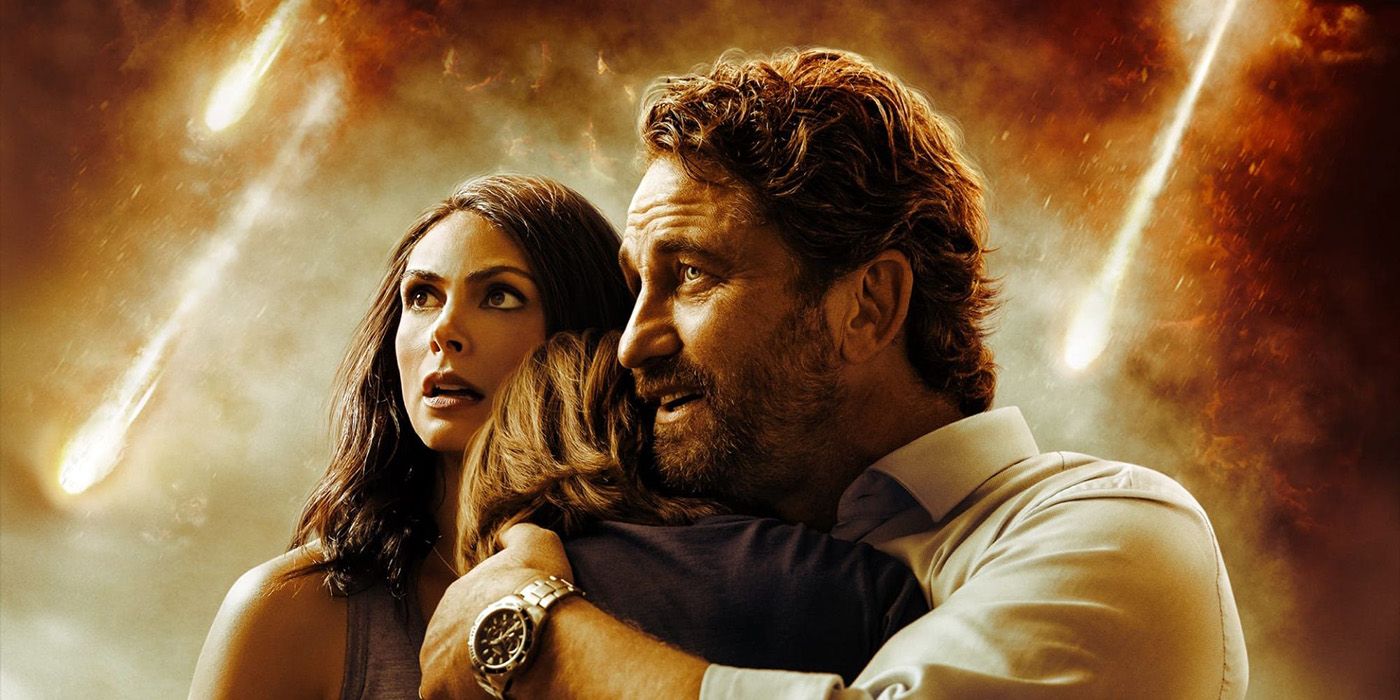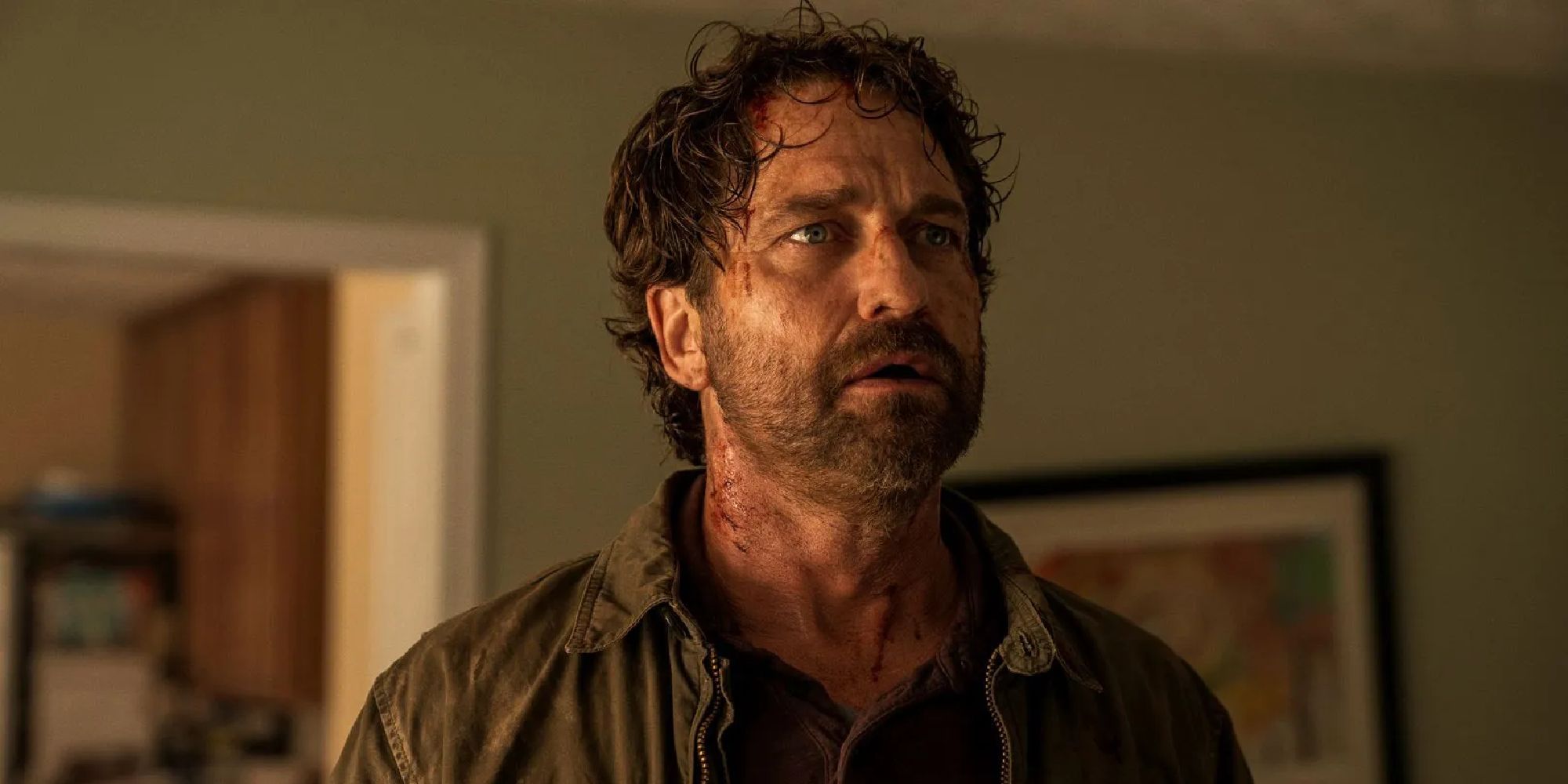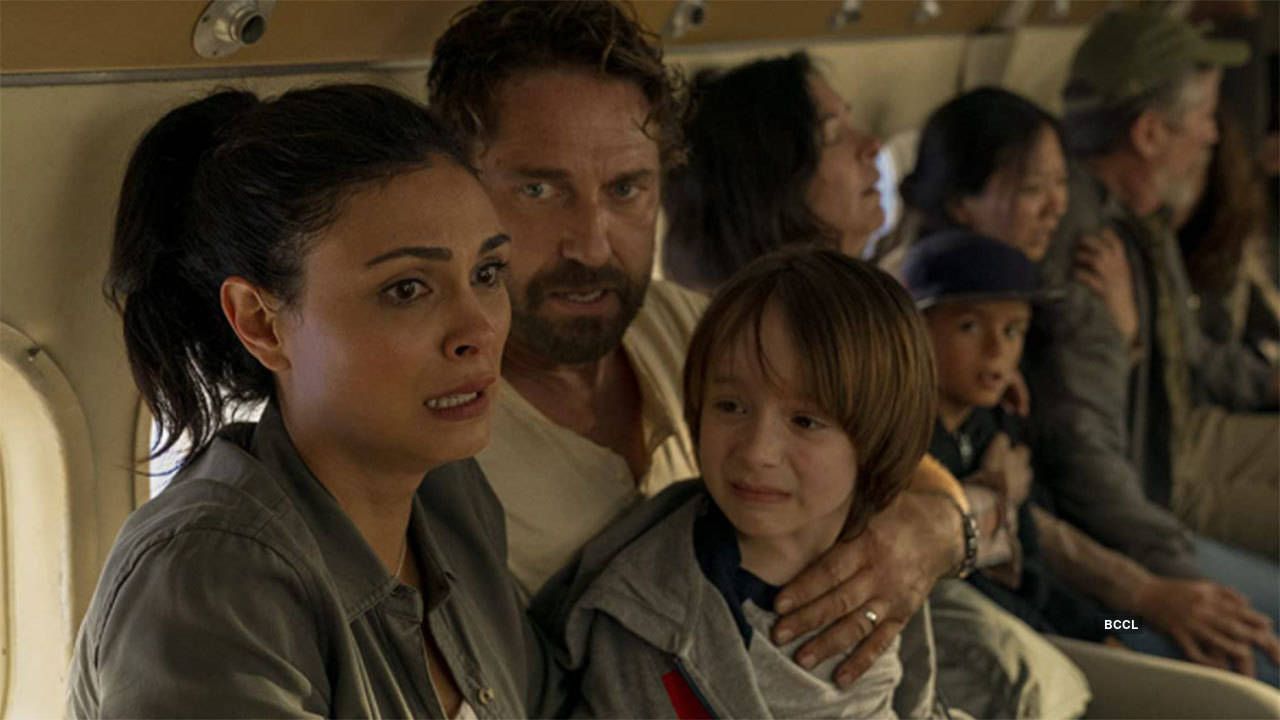It's been nearly two years since the first details came out about the sequel to the 2020 disaster epic Greenland. Under the title Greenland: Migration, the film is slated to continue where its predecessor left off following the destruction of the world as we know it via an extinction-level asteroid collision. The Garrity family would emerge from their Greenland-based shelter along with other survivors in order to start rebuilding in the burnt-down wasteland. Adding to the excitement is that stars Gerard Butler and Morena Baccarin along with director Ric Roman Waugh and writer Chris Sparling all committed to returning for the follow-up.
Since then, however, word has been quiet on the project. Butler and Waugh have joined forces again but for Waugh's upcoming action thriller Kandahar rather than Migration. After that film hits theaters later this month, however, the director's eyes may turn toward bringing the post-apocalyptic film to life. Collider's Steve Weintraub sat down with Waugh ahead of Kandahar's release and received a major update on the status of Greenland: Migration.
The fact that Waugh is even in a place to consider a sequel to the film is a shock to him. Greenland had the unfortunate fate of releasing in December 2020 at the height of the COVID-19 pandemic. "So if you remember, we made Greenland right before the pandemic, we had no idea what COVID was," Waugh said. "Nobody had even heard the word COVID when we filmed Greenland. Then we watched the pandemic unfold, and I shit my pants because I'm like, 'Who the hell is gonna watch a disaster movie in the middle of a disaster?'" The film overcame its dour release and unfitting premise to gross a respectable $52.3 million at the box office, though it really raked in money through VOD. STX Films would eventually pick up the sequel from the Cannes virtual market for a seismic $75 million. Waugh recalls seeing the success and being amazed at the willingness to embrace a fake disaster in the midst of a very real one:
"Then when all the movie theaters shut down and so forth, we had been number one all over the world, that could open up theatrically. There was the United Kingdom that couldn't, some of the bigger marketplaces that couldn't, and then we suddenly ended up with this extraordinary deal. It was the biggest streaming deal in history to come out of North America, and I suddenly watched it catch fire in a way of realizing, 'Oh, they don't wanna be in the disaster they're in, but they'll watch this one that's over here that'll give them a little bit of escapism, but they can still have the same dread and emotion.' So that was a really great surprise to us, that we had anxiety about whether people would really want to embrace a disaster movie during an actual real disaster of a pandemic."
Waugh Always Envisioned Greenland as a Two-Part Project
Success alone didn't drive Waugh to pursue a sequel, however. He imagined Greenland would unfold over two parts from the get-go assuming the first part went over well. "I wish I could say I was always gonna do a two-parter, but we wanted the first movie to work, but take you up to the extinction event," he said. As previously detailed, the film will take place in the aftermath of the comet impacting Earth, but Waugh expects this sequel alone to be enough to wrap up the Garritys' story. "It'll be about who survived, and how did they rebuild the earth when everything was completely burned to the ground. So it's a beautiful kind of way to give you a conclusion of the Garritys and where they go. So, do you call it a sequel? Yeah, but to me, it's more of the final chapter of what this story has to say."
The scope seems to have widened significantly from Greenland's focus on the family as they race to get to safety before the end of the world. Waugh was beyond thankful the film succeeded as it created possibilities the project didn't have available without an established franchise. "I wish we had an IP like Dune that was already built in where, you know, you're gonna do a big two-parter, but we really needed the first movie to work," Waugh added. "We got lucky that we made it work, or it worked during a pandemic, and now we're on to the final chapter."
Now, the whole world is fair game for Migration. The ending of the original film hinted at something bigger for the sequel as shelters around the world prepared for a return to the surface. The world they come back to will be a much different one not just because of the destruction but because of how the geography itself has shifted as Waugh explains, "And the fun of it is, the way that the extinction event happened during the dinosaur period and the continental divides changed, and where the tectonic plates went, we get to kind of F-up the world, so to speak, and create our own kind of utopia or dystopia, what we have now."
When Does Greenland: Migration Take Place?
Waugh detailing the time frame for Greenland: Migration. There's no indication within the first film regarding when everyone returns to the surface to reinhabit the Earth, leaving space for him to play around with the timeline. He turned to Earth's last extinction event and the science around it for his answer. "It's 5 to 7 years later," he said. "It's enough that, which was very true about the last extinction event, was that there was so much toxicity in the atmosphere that nobody could live above ground for quite a while. There was still fires and there's all kinds of stuff going on, ash, you couldn't breathe." Though not as long a wait to return as in an irradiated world like Fallout, Waugh thought it would be intriguing to explore the trauma of people living part of their life trapped underground:
"So we went by science and allowed a number of years to go by to where you realize that these people have been imprisoned underground. What does that do to the human psyche? How does that contribute to when you do go into a migration mode and you're trying to find new places to survive and you have all of that trauma? A little boy that was eight years old, or seven years old, that's now 13 or 14, what is his life as a teenager when he's known nothing else but cement walls and underground? These are the things that we want to play with. So we feel like time underground, it’s factual of what happened, but also it helps us with story."
 Greenland: Migration Could Ramp Up Very Soon
Greenland: Migration Could Ramp Up Very Soon
Work on Migration could finally get underway before long. "We're talking about trying to get this on pretty soon here," Waugh said. Exploring how not just the Garrity family, but various cultures and shelters react to the task of rebuilding is a big ask for one film though. As more IP, like Butler's Has Fallen franchise which Waugh worked on, make the jump to television, the question was raised of whether a Greenland series about reconstruction would be better suited for such an ambitious premise. Right now, though, the focus is solely on channeling that ambition into a film that incorporates a myriad of cultures and languages on a similar scale to the upcoming Kandahar:
"Look, we would love to have the ambitions of doing this next installment and then taking it from there, whether it did a global kind of a TV event… My thing that I'm super fascinated about as a filmmaker is, I grew up in the action heyday of, like, John Wu coming to America and making his movies, and Luc Besson coming here and doing his movies. I want to go to other countries. I wanna go to other worlds and explore local language, and Kandahar let me shoot in six different languages. Why can't I do different things? I think the Greenland universe can do the same thing. How do different cultures deal with a global catastrophe? The way that we watched COVID being dealt with in different countries and different hemispheres, the same thing can happen with this."
When production does eventually get underway, Waugh expects Greenland: Migration to remain as the title. "It'll probably stick, but the whole idea was, what have we done since the beginning of time to go find food resources, the way of survival? We migrate," he explained to Weintraub. "We still chase killer whales. We still chase the great white shark to figure out where their habitats are. We, as all species on this earth, migrate." Waugh invoked our modern-day catastrophe of COVID-19 to show how much the sequel will focus on the tense journey to find new, habitable places to live in a changed world. He teases a heavy focus on survival as resources are wiped out and humanity is forced to rethink the planet itself. "To the big migration after the pandemic in America, look how much our census is gonna change where people live. We thought that was a very interesting thing to play with, of what happens if your food and resources are diminished to the point that you're not gonna survive? You migrate, you go find what you need to get."
Who Else Will Work on Greenland: Migration With Waugh?
Migration will feature a team full of colleagues that Waugh has worked with in the past. One name he's particularly excited to reunite with is Mitchell LaFortune who penned Kandahar. LaFortune and Waugh had met while working together on Greenland as the writer was brought on to help with revisions. "And so, Basil Iwanyk, who produced Greenland, had brought Mitch's script to me, that was called Burn Run became Kandahar, so Mitch is now on the next chapter with me, Mitch is writing Greenland," Waugh detailed regarding how came to bring LaFortune aboard. That doesn't mean Sparling is taking a back seat though. According to Waugh, Sparling has been hard at work penning the sequel, but it'll be the director and LaFortune who are "kind of bringing it home and doing our thing."
One thing for certain about the production is that it'll come before audiences see another Has Fallen film. "We had talked about Night Has Fallen, which would be the fourth, and I know I had seen that they're gonna make a television series that Gerry won't be in, but they're producing, and I think that's a very interesting idea," Waugh detailed. He personally found exploring Greenland and other projects with Butler to be more interesting than digging up Mike Banning for another go, but he also believes Butler's on the same wavelength. "The thing I love about Gerry is he's a stubborn SOB, like me, and very passionate, so we don't want to really kind of go back and repeat things. I think that the Angel Has Fallen franchise, that movie kind of redefined him in a way of the flawed hero that was relatable and more of a human quality. I don't know, we would probably just do another escapade of Mike Banning." He went on to praise Iwanyk for guiding them forward, adding:
"I don't know if that really interests us as much as where Greenland 2 would be a continuation of what you saw, but in a completely fresh way where nothing is regurgitated, it's all a new experience. So I think the other ones that we would want to find together are news stories. I remember after Green they were like, “What the hell are we gonna do now?” And then Basil Iwanyk just laid this beautiful script called Kandahar on our lap, and we're like, “There you go.” So I don't know what's out there, but there'll be something that we tackle again together, but hopefully it'll be fresh and something that we both go, “Let's go butt heads and fight because this one's worth it.” And that's what we want, we want to push each other and not rest on our laurels."
Stay tuned here at Collider for more on Greenland: Migration as work gets underway. Kandahar releases in theaters on May 26. Check out the trailer below.



